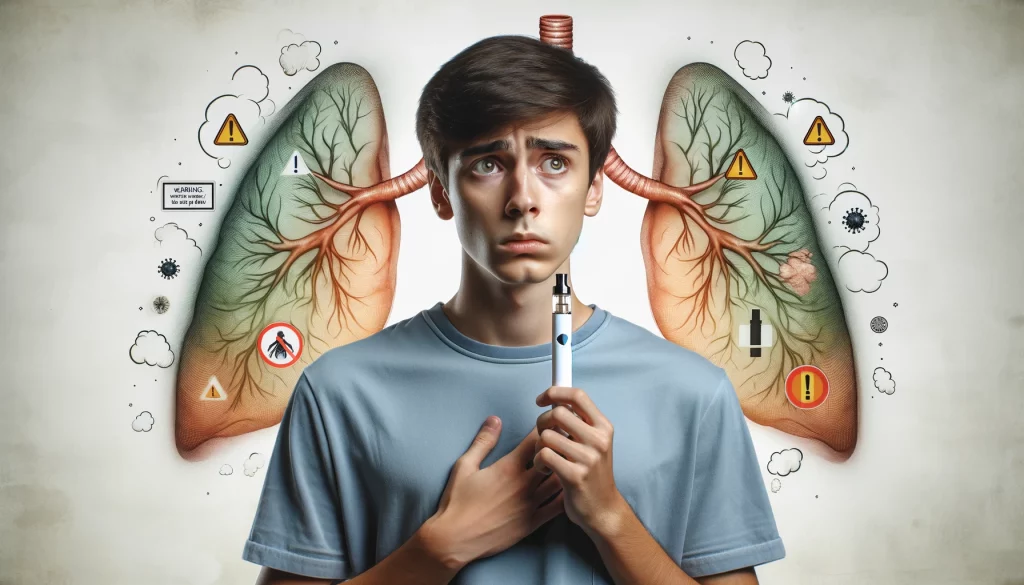Vaping has become increasingly popular, especially among young people, as an alternative to smoking traditional cigarettes. However, many are left wondering: can just one puff of vape harm you? This article delves into the potential risks associated with taking a single puff of a vape and provides a comprehensive analysis based on current research and expert opinions.
Short-Term Health Risks
Taking even one puff from a vape can introduce harmful chemicals into your body. When you inhale from a vape, you’re inhaling an aerosol that can contain nicotine, flavorings, and other chemicals. These substances can cause immediate harm to your respiratory system. According to research, a single puff can lead to:
- Lung Damage: Chemicals in the vapor can cause inflammation and damage to lung tissues, leading to conditions such as bronchitis and potentially even acute respiratory distress.
- Breathing Problems: Symptoms like coughing, wheezing, and shortness of breath can occur soon after vaping.
- Organ Damage: The chemicals inhaled can affect other organs as well, potentially causing heart, liver, and kidney damage.

Long-Term Health Risks
While the short-term effects are concerning, the long-term risks of vaping are even more alarming. Regular exposure to the chemicals in e-liquids can lead to chronic health issues:
- Addiction: Nicotine is highly addictive, and even a small amount can start the process of addiction. This makes it harder to quit and can lead to prolonged use and increased exposure to harmful substances.
- Cancer: Some of the chemicals found in vape aerosols are known carcinogens. Long-term exposure increases the risk of developing cancers, particularly of the lung.
- Heart Disease: Vaping can increase the risk of cardiovascular issues such as heart attacks and strokes due to the harmful effects on blood vessels.
Myths and Misconceptions
There are several myths surrounding the safety of vaping, particularly concerning occasional use:
- Myth 1: One puff won’t hurt you. While one puff might not cause immediate, noticeable harm, it can still introduce harmful chemicals into your body, which can start the process of lung damage and other health issues.
- Myth 2: Vaping is as harmful as smoking. Although vaping is considered less harmful than smoking traditional cigarettes, it is not without risks. Vaping still exposes users to potentially dangerous substances.
Social and Environmental Impact
Vaping also has broader implications beyond individual health. Socially, it can be seen as trendy among youths, potentially leading to peer pressure and increased use among teenagers. Environmentally, the disposal of vape cartridges and batteries poses a pollution risk.
Conclusion
In conclusion, even one puff of a vape can have significant health implications. From immediate respiratory issues to long-term risks like cancer and heart disease, the dangers of vaping should not be underestimated. It’s crucial to stay informed about these risks and make choices that prioritize your health and wellbeing.
FAQs
Can vaping once cause lung cancer?
While one puff is unlikely to cause cancer on its own, it can introduce carcinogenic chemicals into your body, increasing the risk over time.
Is vaping safer than smoking?
Vaping is generally considered less harmful than smoking traditional cigarettes, but it is not risk-free and still poses significant health risks.
Can you get addicted to vaping after one puff?
Nicotine is highly addictive, and even a small exposure can start the process of addiction, making it harder to quit later on.
Are there any safe e-liquids?
No vaping product is entirely safe. Even nicotine-free e-liquids can contain harmful substances that pose health risks.
What are the signs of lung damage from vaping?
Common signs include coughing, shortness of breath, wheezing, and chest pain. If you experience these symptoms, seek medical advice promptly.
By understanding the risks and staying informed, you can make healthier choices and protect yourself from the harmful effects of vaping.



